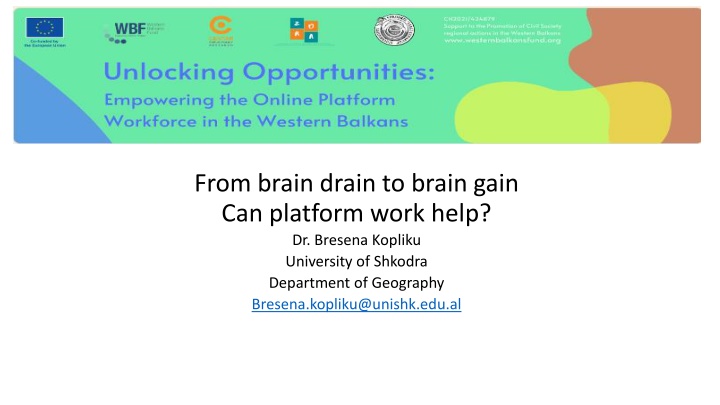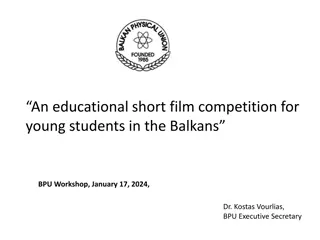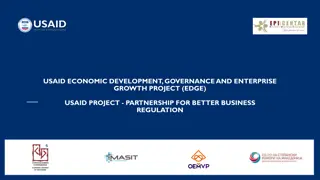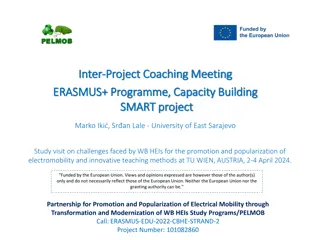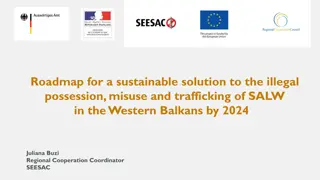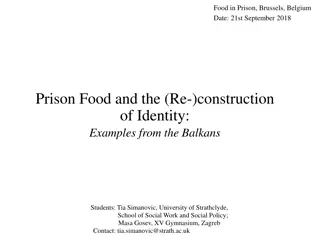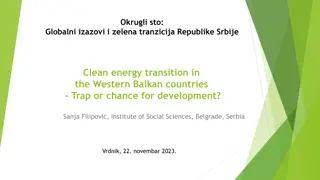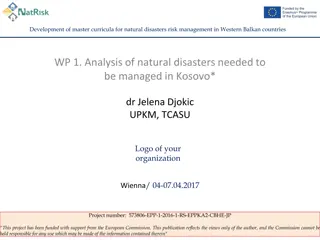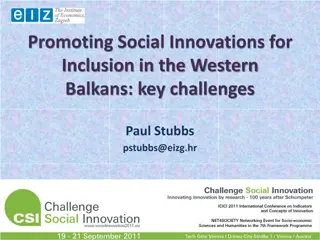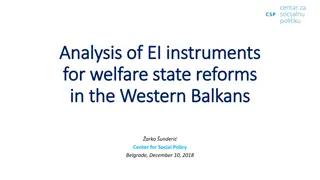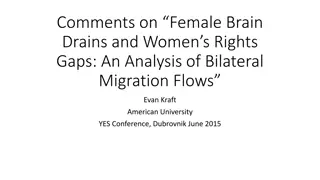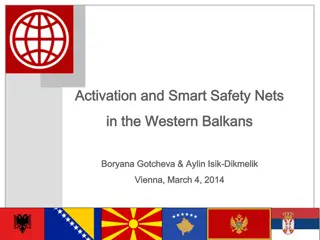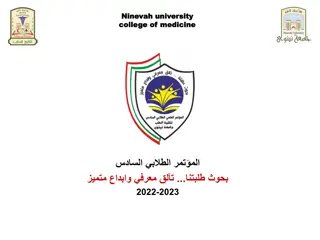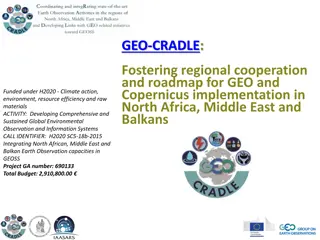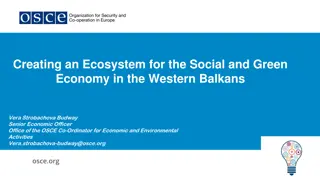From Brain Drain to Brain Gain: Can Platforms Help in Western Balkans?
Brain drain poses a significant challenge in Albania, where skilled individuals are migrating due to various socio-economic issues. This phenomenon impacts the workforce and economy, requiring innovative solutions to reverse the trend and foster brain gain. Dr. Bresena Kopliku from the University of Shkodra sheds light on this complex issue and explores the potential of platforms to address it and retain talent within the region.
Download Presentation

Please find below an Image/Link to download the presentation.
The content on the website is provided AS IS for your information and personal use only. It may not be sold, licensed, or shared on other websites without obtaining consent from the author.If you encounter any issues during the download, it is possible that the publisher has removed the file from their server.
You are allowed to download the files provided on this website for personal or commercial use, subject to the condition that they are used lawfully. All files are the property of their respective owners.
The content on the website is provided AS IS for your information and personal use only. It may not be sold, licensed, or shared on other websites without obtaining consent from the author.
E N D
Presentation Transcript
From brain drain to brain gain Can platform work help? Dr. Bresena Kopliku University of Shkodra Department of Geography Bresena.kopliku@unishk.edu.al
Brain drain WESTERN BALKANS WORKING AGE POPULATION DECLINED BY MORE THAN 400,000 IN PAST 5 YEARS Brain drain is particularly significant in Albania, where the highly educated account for around 40% of the total cumulative outflow From mainly a migration of poverty, high unemployment rates, desperation and protest to a more structural one with the migration mainly of the youngsters and highly educated sections of the population
There are jobs, but there are not professionals Over 80% of medium and large businesses and 54% of small businesses reported having ICT vacancies in the last 12 months (2022) skills mismatch between what the education system equips youth with, and what the labour market requires (digital knowledge, data entry knowledge) Different approaches to the labour market (life work balance; creativity) Vacancies mainly in Tirana Low wages
Migration from Albania wicked problem King (2021) a wicked problem is a problem that is extremely difficult or impossible to solve incomplete information, contradictory forces, changing circumstances, multiple layers of complexity interdependencies with other problems.
Albania is still locked in the phase of on-going large-scale migration (G deshi & King, 2021; King & G deshi, 2019) young, educated and qualified people 40% of the emigration from Albania could be classified as brain drain (Leitner, 2021); still high potential rates of migration 30% (Public Opinion Balkan Barometer). high unemployment rates, 10,9% (INSTAT 2023) endemic corruption, the unfavourable business climate, informal markets, Low standard of education and health services widening socio-economic and spatial differences,
The virtualization of work Changes of the traditional social model of industrialized countries based on place, time and action Global integration of work point of entry for new immigrants Precarious and atypical work conditions Non standard jobs in the platform economy Silver bullet solution for out migration (?) Job offers from online platforms require employees with not very high data entry skills (basic digital knowledge) to software development projects (specialized knowledge)
Methodology 20 in depth interviews 8 women/12 men IT (12), Teaching (4), Architecture (1), Literature (1), Translator (2) Transcribed, coded, translated, quoted
Migration and cloudwork web-based Many cloudworkers embrace the flexible and informal conditions of cloudwork while shuttling back and forth with regular employment Cloudwork allows them to live middle class lifestyles, Full time or part time job Trust more the platform itself than the state Do not want the policy to intervene in their work Do not consider migration
Not only ICT A. K, (M, 29, chemistry teacher ) My primary source of incomes is the work online because it gives you more, much higher incomes. K.M (F, 29, math teacher) As for my career, after finishing my master studies for math in Norway, I returned in Albania to teach, I have always thought that teaching would be my only priority, but now, that I have been working for 6 years as a teacher, I think that I like diversity in my jobs, not monotony. I think that through Upwork I can find different possibilities.
Not only ICT Five countries(Albania, Bosnia and Herzegovina, Montenegro, North Macedonia and Serbia) were ranked among the top ten in the world for the number of translators in relation to their population B.K (F, 45, English teacher) I have translated 40 000 words for 10 days, working 4 hours per day, and I was paid 300 Euro, which is quite good for me It was not difficult, but just voluminous, and no, it can t be done through google translate
Minimum wage 293 Euro/month Average wage 599 Euro/month Location based gig-work 450 Euro 1000 Euro/month Web based gig-work 36646$ /year 51600$/year
cloudwork Being things like they are in Albania, I wouldn t want the state to interfere with what I do Food delivery Yes, stress, unseen stress by the traffic, I have kidney pain. Sometimes I almost get maid, want to grab the phone and throw it on the ground, I'd rather live with a piece of bread.
Conclusions Brain drain is the biggest challenge of this new decade that should dictate/shape the current and future policy agenda of our economies. the skills mismatch between what the education system equips youth with, and what the labour market requires. Cloudwork for return migration and transnationalism right policies Platform work can help by allowing highly skilled professionals to work for global companies while at the same time contributing to the country s economy and development, The future of work will shape migration trajectories and the migrants labour market relationship. Gig platforms are emerging as new players in the political economy in Albania by creating the possibility to bring the salaries of the destination country to the potential migrant and not vice- versa as the traditional theories of migration suggest. Towards non-linearity of the migration process with a variety of migration paths and sequences Silence of policy for the gig/platform economy For a rapid economic and social development and as a consequence less migration it is needed the right policy mix and synergy among elements Olesen (2003).
Thank you! Altenried, M. A. (2023). Platforms, Labour, and Mobility. In The Routledge Handbook of Gig Economy (pp. 180 189). Routledge. https://doi.org/10.4324/9781003161875-14 Degryse, C. (2023). (Re)Inventing the Collective Dimension in a Virtualised Labour Market. In The Routledge Handbook of the Gig Economy (pp. 95 115). Routledge. https://doi.org/10.4324/9781003161875-9 Institute of Statistics Albania [INSTAT]. (2023, June 12). Statistikat e pagave [Press release]. https://www.instat.gov.al/media/11708/pagat_press-rease-t1_-2023-altcom-2.pdf Ness, I. (2022). The Routledge Handbook of the Gig Economy. Taylor & Francis. Pichault, F., & Naedenoen, F. (2023). THE CHALLENGES OF TOTAL TALENT MANAGEMENT IN THE GIG ECONOMY. In The Routledge Handbook of Gig Eonomy (pp. 74 93). Routledge. https://www.routledge.com/The-Routledge-Handbook-of-the-Gig-Economy/Ness/p/book/9780367752903# Van Doorn, N. (2023). Liminal Precarity and Compromised Agency Migrant experiences of gig work in Amsterdam, Berlin, and New York City. In The Routledge Handbook of the Gig Economy (pp. 158 179). Routledge. VENDIM Nr. 113, dat 1.3.2023 P R P RCAKTIMIN E PAG S MINIMALE N SHKALL VENDI. (2023, March 4). AlProfit. https://alprofitconsult.al/vendim-113-date-01-03-2023-per-percaktimin-e-pages-minimale-ne- shkalle-vendi/
